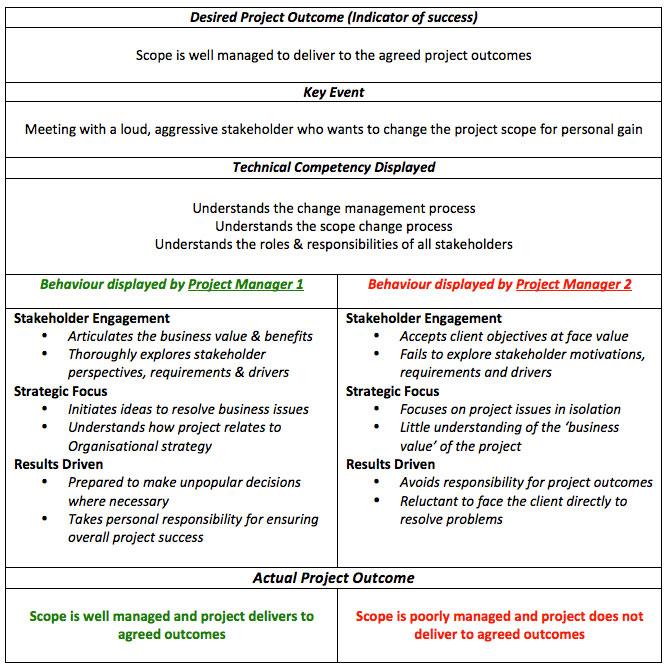Linking project manager behaviour to the bottom line
Therefore a superior project manager needs to ensure that:
- Budget, schedule and resources are effectively managed to deliver agreed outcomes.
- Stakeholders are appropriately managed and communication is logical and structured.
Now look at an example of a key event in the life of a project that will impact on these desired outcomes.
Event: Meeting with a loud and aggressive stakeholder who wants to change the scope of a project for personal gain.
In the context of traditional methodology, our project manager would need strength in areas such as scope management, time management, cost management and risk management. They should understand how to:
- Collect requirements, define the scope, and manage scope changes
- Define and sequence activities, and estimate resources
- Develop a work breakdown structure and a work schedule
- Identify risks and plan an approach to their management.
The traditionalists would have us believe that if someone has the knowledge above, then they are perfectly well equipped to manage a desired outcome from the event.
However, the new frontier of thinking suggests that greater diligence is needed because it is the project manager’s behaviour, not their understanding of methodology, that will have the greatest influence on the end result.
Two project managers
Consider the different approaches of two different project managers, assuming they both have the same level of certification, experience and understanding of methodology, but different levels of behavioural capability. In particular, consider the impact of different levels of stakeholder engagement, strategic focus and results drive.
As you can see, if Project Manager 2 takes little personal ownership of the project outcome, views projects in isolation, and is steamrolled in the face of conflict, then there is little chance that they will successfully deliver the project to its agreed scope.
On the other hand, if Project Manager 1 is proactive, personally committed to successful delivery, and is considerate of how projects contribute to the broader business strategy then there is a strong likelihood that the scope will be managed to a superior standard, and the agreed outcomes will be delivered.
If we understand the desired outcomes from our projects, then it is clear to see the tangible impact of behavioural capability on their success. Assuming that successful project delivery forms part of your organisational strategy, then there is also a much broader issue at play.
In summary, if you do not invest the time to measure and develop the specific behavioural capability required by your project managers, then, just like the Titanic example, you are exposing your organisation and your bottom line to an unnecessary level of risk.


